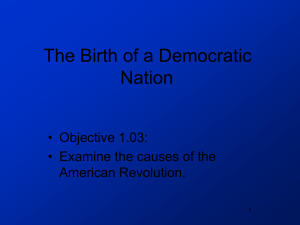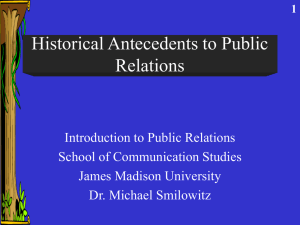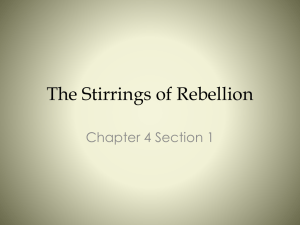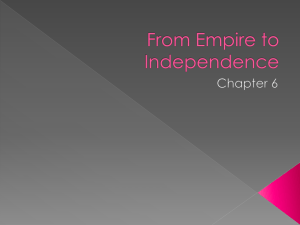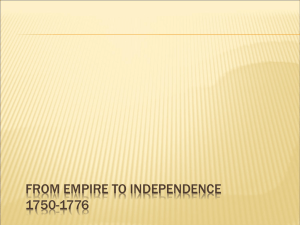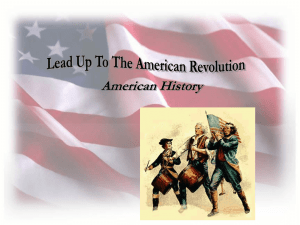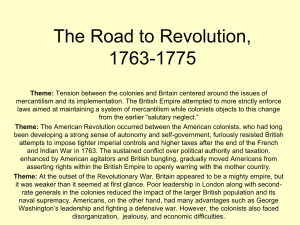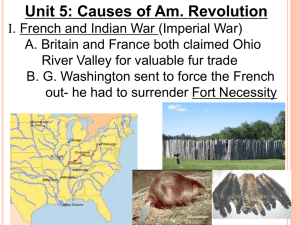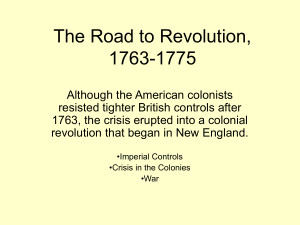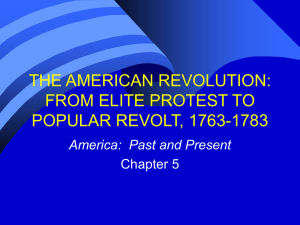File
advertisement
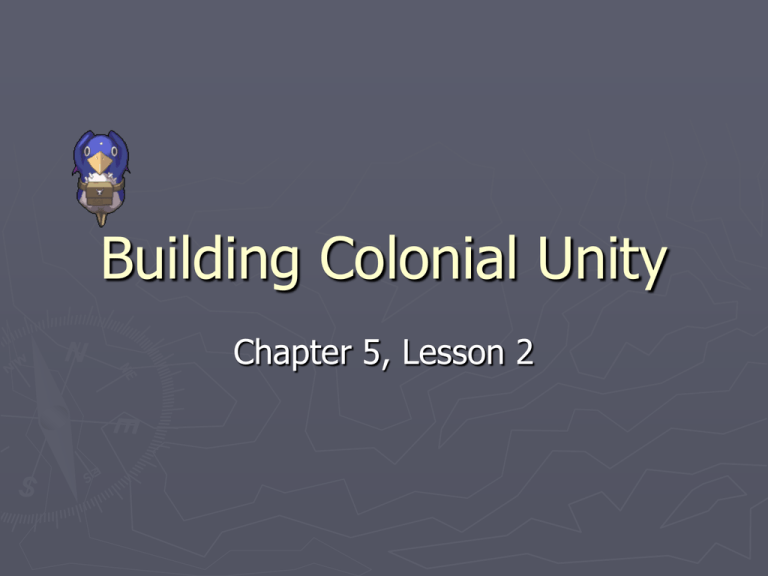
Building Colonial Unity Chapter 5, Lesson 2 Trouble in Boston (Prelude) 1768, John Hancock’s ship Liberty docked in at Boston to unload a shipment of wine and take on new supplies. ► In Customs officials charged Hancock with smuggling and had seized the ship from him. Angry Townspeople filled the streets as word spread of the news and shouted against Parliament and the taxes imposed on them. This would be yet another affair to unite the colonists against British Policies. Trouble in Boston ► Protests like the Liberty affair made British colonial officials worry. ► In the summer of 1768, word was sent back to Britain that the colonies were on the brink of rebellion. Parliaments response was to send two regiments of troops to Boston. The newly arrived “Redcoats” set up camp right in the middle of the city. Trouble in Boston ► Many Colonists in (especially in Boston) felt that the British had pushed them too far. Passed a series of laws that violated colonial rights. Now, they sent an army to occupy colonial cities. It didn’t help that these soldiers in Boston acted rudely and even violently to the colonist. ► Red coats were mostly poor and received little pay. Stole goods from local shops or scuffled with boys who taunted them in the streets. On off-hours they competed with colonists for jobs the Bostonians wanted. The hatred grew stronger everyday. The Boston Massacre ► Relations between the redcoats and the Boston colonists grew more tense. ► On March 5, 1770, the tension peaked. A fight broke out between townspeople and soldiers. While some British officers tried to calm the crowd, one man shouted, “We did not send for you. We will not have you here. We’ll get rid of you, we’ll drive you away!” ► The angry colonists picked up whatever they could to use as weapons. Sticks, shovels, stones, clubs, etc. The Boston Massacre ► They pushed forward towards the customs house on King’s Street. ► As the crowd moved closer, he sentry on duty called for help. The crowd responded by throwing snowballs, stones, oyster shells, and pieces of wood at the soldiers. The colonists yelled, “Fire you bloodybacks, you lobsters!” “You dare not fire!” ► After one of the soldiers fell over, the nervous and confused redcoats did fire. The Boston Massacre ► Several shots rang out, and five colonists were dead. ► One Bostonian cried, “Are the inhabitants to be knocked down in the streets? Are they to be murdered in this manner?” ► Crispus Attucks, a dock worker who was part African, part Native American, was amongst the killed. ► The tragic even came to be known as the Boston Massacre. Crispus Attucks The Word Spreads ► Colonial leaders used the news of the killings as propaganda (information designed to influence opinion) against the British. Samuel Adams put up posters describing the “Boston Massacre” as a slaughter of innocent American by blood thirsty redcoats. Paul Revere’s engraving showed a British officer giving the order to open fire on an orderly crowd. It was a powerful image that strengthened antiBritish feeling. Boston Massacre – Paul Revere The Word Spreads ► The Boston Massacre led many colonists to call for stronger boycotts on British goods. At this point Parliament repealed ALL of the Townshend Acts except for the one on tea. ► Many colonists believed they had won another victory. They ended their boycott and started to trade with British merchants again. ► Some colonial leaders continued to call for resistance to British rule. The Word Spreads ► Samuel Adams revived the committee of correspondence (an organization used in earlier protests.) They began to circulate writings about grievances against British rule. Soon, other committees sprang up in other colonies, and bringing together protestors opposed to British measures. A Crisis Over Tea ► In the early 1770s, some Americans considered British colonial policy a “conspiracy against liberty.” The British actions in 1773 seemed to confirm that. ► The British East India Company was facing ruin and in order to save it they passed the Tea Act in 1773. Allowed for tea to be shipped to the colonies without paying most of the taxes usually placed on tea. Additionally, they could bypass colonial merchants and sell to the shops directly at a lower price. The Tea Act gave the B.E.I.C a favorable advantage over colonial merchants. Colonial Demands ► Colonial merchants once again call for a boycott of British goods. ► Samuel Adams and other denounced the British monopoly. Claimed the Tea Act was just another attempt to interfere with colonial liberties. ► At large public meetings in Boston and Philadelphia vows were made to prevent the East India Company from unloading tea in the colonies. The Daughters of Liberties gave out pamphlets that said instead of parting with their freedom, we’ll part with our tea.” Colonial Demands ► Parliament ignored the warnings that another crisis was… brewing. (HA!) ► The East India Company shipped to Philadelphia, Boston, New York, and Charles Town Colonists forced the ships coming to New York and Philadelphia to turn back. The tea in Charles Town was seized and stored in a warehouse. In Boston, a showdown was about to begin. The Boston Tea Party ► Three tea ships would arrive in Boston in 1773. ► The governor had refused to let the ships turn back. He also had his home destroyed by Stamp Act Protestors. ► When he ordered for the ships to unload Adam’s and the Boston Sons of Liberty went into action. They disguised themselves as Mohawks and armed with hatchets marched to the wharves. (a sort of pier for a ship to dock next to in order to unload cargo) The Boston Tea Party ► At midnight they boarded the ships and threw over 342 chests of tea overboard. This became known as the Boston Tea Party. ► Word quickly spread over the act of defiance. Men and women all over were celebrating the bravery of the Boston Sons of Liberty. Still, no one spoke of challenging British rule, and colonial leaders continued to consider themselves British. The Intolerable Acts ► When London found out about the Boston Tea Party they did not react quite the same. King George III came to the realization that he was losing control of the colonies. “We must master them, or totally leave them alone.” –King George III ► They refused to give up the colonies so easily and so set out to punish Boston. They passed the Coercive Acts (laws intended to be a harsh punishment for the colonists in Boston.) The Intolerable Acts ► The Coercive Acts included: Boston Port Act – Closed the port of Boston until payment was received for the damaged tea. The Massachusetts Government Act – Restricted town meetings and turned the governor’s council into an appointed body. The Administration of Justice Act – Made British Officers immune to criminal prosecution in Massachusetts. The Quartering Act – Required colonists to put up British soldiers, often in their own homes. The Quebec Act – Set up a permanent government in Quebec and allowed for religious freedom towards French Catholics. The Intolerable Acts ► Parliament had hoped to isolate Boston from the other colonies. Instead, the colonies showed support by sending food and clothing. Colonists maintained that these were all a violation of rights towards English citizens. The Quebec act gave the land west of the Appalachian Mountains away that they felt they had claimed. ► Their feelings towards the new laws was made clear by their name for it – The Intolerable Acts.
